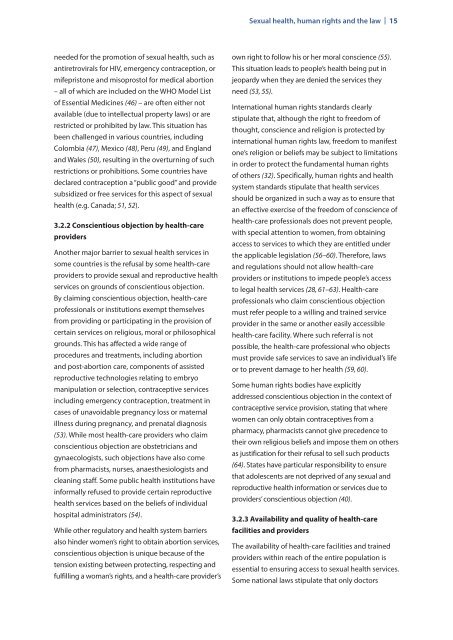Sexual health human rights and the law
1XoaDvM
1XoaDvM
You also want an ePaper? Increase the reach of your titles
YUMPU automatically turns print PDFs into web optimized ePapers that Google loves.
<strong>Sexual</strong> <strong>health</strong>, <strong>human</strong> <strong>rights</strong> <strong>and</strong> <strong>the</strong> <strong>law</strong> | 15<br />
needed for <strong>the</strong> promotion of sexual <strong>health</strong>, such as<br />
antiretrovirals for HIV, emergency contraception, or<br />
mifepristone <strong>and</strong> misoprostol for medical abortion<br />
– all of which are included on <strong>the</strong> WHO Model List<br />
of Essential Medicines (46) – are often ei<strong>the</strong>r not<br />
available (due to intellectual property <strong>law</strong>s) or are<br />
restricted or prohibited by <strong>law</strong>. This situation has<br />
been challenged in various countries, including<br />
Colombia (47), Mexico (48), Peru (49), <strong>and</strong> Engl<strong>and</strong><br />
<strong>and</strong> Wales (50), resulting in <strong>the</strong> overturning of such<br />
restrictions or prohibitions. Some countries have<br />
declared contraception a “public good” <strong>and</strong> provide<br />
subsidized or free services for this aspect of sexual<br />
<strong>health</strong> (e.g. Canada; 51, 52).<br />
3.2.2 Conscientious objection by <strong>health</strong>-care<br />
providers<br />
Ano<strong>the</strong>r major barrier to sexual <strong>health</strong> services in<br />
some countries is <strong>the</strong> refusal by some <strong>health</strong>-care<br />
providers to provide sexual <strong>and</strong> reproductive <strong>health</strong><br />
services on grounds of conscientious objection.<br />
By claiming conscientious objection, <strong>health</strong>-care<br />
professionals or institutions exempt <strong>the</strong>mselves<br />
from providing or participating in <strong>the</strong> provision of<br />
certain services on religious, moral or philosophical<br />
grounds. This has affected a wide range of<br />
procedures <strong>and</strong> treatments, including abortion<br />
<strong>and</strong> post-abortion care, components of assisted<br />
reproductive technologies relating to embryo<br />
manipulation or selection, contraceptive services<br />
including emergency contraception, treatment in<br />
cases of unavoidable pregnancy loss or maternal<br />
illness during pregnancy, <strong>and</strong> prenatal diagnosis<br />
(53). While most <strong>health</strong>-care providers who claim<br />
conscientious objection are obstetricians <strong>and</strong><br />
gynaecologists, such objections have also come<br />
from pharmacists, nurses, anaes<strong>the</strong>siologists <strong>and</strong><br />
cleaning staff. Some public <strong>health</strong> institutions have<br />
informally refused to provide certain reproductive<br />
<strong>health</strong> services based on <strong>the</strong> beliefs of individual<br />
hospital administrators (54).<br />
While o<strong>the</strong>r regulatory <strong>and</strong> <strong>health</strong> system barriers<br />
also hinder women’s right to obtain abortion services,<br />
conscientious objection is unique because of <strong>the</strong><br />
tension existing between protecting, respecting <strong>and</strong><br />
fulfilling a woman’s <strong>rights</strong>, <strong>and</strong> a <strong>health</strong>-care provider’s<br />
own right to follow his or her moral conscience (55).<br />
This situation leads to people’s <strong>health</strong> being put in<br />
jeopardy when <strong>the</strong>y are denied <strong>the</strong> services <strong>the</strong>y<br />
need (53, 55).<br />
International <strong>human</strong> <strong>rights</strong> st<strong>and</strong>ards clearly<br />
stipulate that, although <strong>the</strong> right to freedom of<br />
thought, conscience <strong>and</strong> religion is protected by<br />
international <strong>human</strong> <strong>rights</strong> <strong>law</strong>, freedom to manifest<br />
one’s religion or beliefs may be subject to limitations<br />
in order to protect <strong>the</strong> fundamental <strong>human</strong> <strong>rights</strong><br />
of o<strong>the</strong>rs (32). Specifically, <strong>human</strong> <strong>rights</strong> <strong>and</strong> <strong>health</strong><br />
system st<strong>and</strong>ards stipulate that <strong>health</strong> services<br />
should be organized in such a way as to ensure that<br />
an effective exercise of <strong>the</strong> freedom of conscience of<br />
<strong>health</strong>-care professionals does not prevent people,<br />
with special attention to women, from obtaining<br />
access to services to which <strong>the</strong>y are entitled under<br />
<strong>the</strong> applicable legislation (56–60). Therefore, <strong>law</strong>s<br />
<strong>and</strong> regulations should not allow <strong>health</strong>-care<br />
providers or institutions to impede people’s access<br />
to legal <strong>health</strong> services (28, 61–63). Health-care<br />
professionals who claim conscientious objection<br />
must refer people to a willing <strong>and</strong> trained service<br />
provider in <strong>the</strong> same or ano<strong>the</strong>r easily accessible<br />
<strong>health</strong>-care facility. Where such referral is not<br />
possible, <strong>the</strong> <strong>health</strong>-care professional who objects<br />
must provide safe services to save an individual’s life<br />
or to prevent damage to her <strong>health</strong> (59, 60).<br />
Some <strong>human</strong> <strong>rights</strong> bodies have explicitly<br />
addressed conscientious objection in <strong>the</strong> context of<br />
contraceptive service provision, stating that where<br />
women can only obtain contraceptives from a<br />
pharmacy, pharmacists cannot give precedence to<br />
<strong>the</strong>ir own religious beliefs <strong>and</strong> impose <strong>the</strong>m on o<strong>the</strong>rs<br />
as justification for <strong>the</strong>ir refusal to sell such products<br />
(64). States have particular responsibility to ensure<br />
that adolescents are not deprived of any sexual <strong>and</strong><br />
reproductive <strong>health</strong> information or services due to<br />
providers’ conscientious objection (40).<br />
3.2.3 Availability <strong>and</strong> quality of <strong>health</strong>-care<br />
facilities <strong>and</strong> providers<br />
The availability of <strong>health</strong>-care facilities <strong>and</strong> trained<br />
providers within reach of <strong>the</strong> entire population is<br />
essential to ensuring access to sexual <strong>health</strong> services.<br />
Some national <strong>law</strong>s stipulate that only doctors


